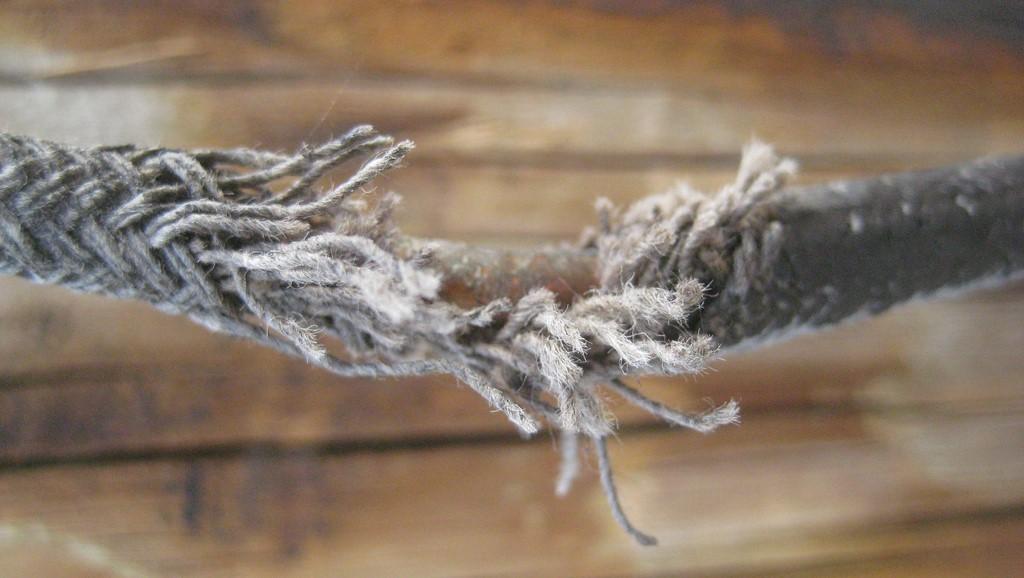This stress expert has some post-election advice: Believe that your political opponents can change
This image captures the essence of "stressed out" — or, in this case, frayed at the ends.
If there’s one word that can sum up our feelings about this year’s presidential election — the most polarizing and bitterly fought in recent memory — it might just be “stressful.”
In October, a survey by the American Psychological Association found that the election was a significant source of stress for more than half of all Americans. And now that Election Day has passed, we’re probably still reeling — whether from a hard-fought battle or our candidate’s loss at the polls.
In fact, Stanford psychologist Kelly McGonigal has a more precise phrase for what many Americans are feeling post-Election Day: "social mistrust."
“They feel like the country has changed, they don’t know who these people are any more,” she says. “They don't feel safe or respected or valued in their own community. And this is not the kind of stress that you can relieve with a bubble bath or glass of wine.”
Far from it: Studies have shown that social mistrust can leach from our minds into our bodies, where it may have real physical consequences.
“Some researchers who study genetics have found that social mistrust can change gene expression that alters the immune system,” McGonigal says. “It can change your brain function in a way that increases your risk of everything we don't want, from depression to heart disease.”
In particular, McGonigal notes that the type of social mistrust many of us are feeling post-election often leads to feelings of despair and social disconnection. When this happens, we develop a “threat response” to deal with the stress in unproductive ways — say, an urge to “move to Canada, or be really destructive, to burn things down, to heap more suffering on top of suffering.”
In the case of this election, our stressors aren’t just going to evaporate. McGonigal says that’s OK. “Stress is a signal that something that we care about is at stake,” she says.
However, we can take steps to change how our bodies respond when we get seriously stressed. Our bodies have multiple stress responses, and not all of them are as destructive as our threat responses.
“We know that you can have a challenge response, which is a stress response that actually gives you energy and courage,” McGonigal says. “It creates the biology of courage so that you can act. You can have a 'tend and befriend' stress response that makes you feel actually more empathy for others and a desire to come together to do something positive. And those are stress responses. Not all stress is bad.”
To activate these productive stress responses, McGonigal says, we’ll need to transform our social mistrust — our sense that others are the enemy. To do that, we have to believe that our adversaries and the situation can change, a “mindset reset” that’s supported by research. McGonigal cites one Stanford study where researchers reminded participants that people, in general, can change.
“They were then more likely to speak up against bias, against racism or sexism,” she says. “And they were also more open to interacting with people who express that bias. They were more willing to collaborate, and they were less likely to want to avoid those people, or to try to humiliate them.”
And McGonigal says that there have been other experiments with similar outcomes.
“One that was conducted at the IDC [research university] in Israel found that when you remind people that conflicts can change, it increased hope,” she says. “And it increased people’s willingness to actually collaborate and compromise to try to reach a more positive outcome with their political adversary.”
So, as you fret in front of the television, or scan newspaper headlines in the grocery store checkout line, here’s a reminder to take care of your body, by taking care of others — and believing that your political opponents can change their views. It’s good for you on a cellular level.
“If you don't know what to do about politics, do something good for a neighbor,” McGonigal says. “Do something good for a friend. Do something good for a stranger. And because it changes our physiology, it's basically the opposite of a threat response. It's good for us, our immune systems, our cardiovascular systems. It creates hope and a sense of common humanity.”
If nothing else, reaching out to others fights the urge we often feel, with everyday stresses, to self-isolate. That’s important because this election stress is “bigger than self," McGonigal says.
“Finding ways to be with communities that you care about — friends, family, other communities — it's really important. And it's really important to strengthen that sense that ‘I'm not alone,’ and also that sense that ‘I have something to offer.’”
This article is based on an interview that aired on PRI's Science Friday.
We’d love to hear your thoughts on The World. Please take our 5-min. survey.
